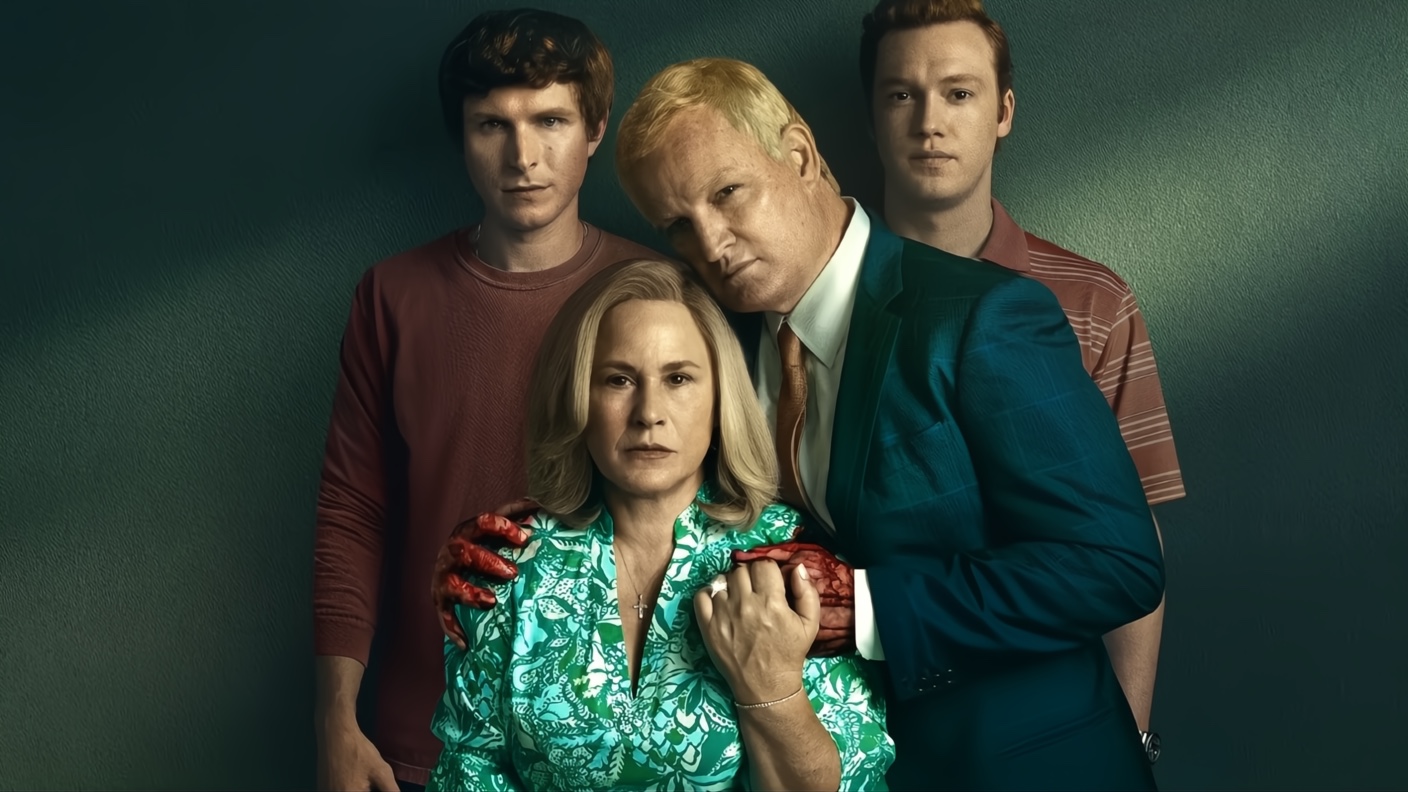TL;DR: Brilliant acting, unbearable people, and a slow drip of emotional sewage. Arquette shines, but the show leaves you needing a shower.
Murdaugh: Death in the Family
There’s a special kind of exhaustion that comes from watching people rot in real time — and I don’t mean zombies, I mean the human kind. The rich kind. The kind of moral decay so slow and deliberate it starts to smell like old money and gasoline. That’s what Murdaugh: Death in the Family feels like. Not a TV show, but an autopsy — a long, methodical dissection of privilege, greed, and generational cruelty, only to find out that the organs are as rancid as you suspected. And yet, in the middle of this true-crime swamp, Patricia Arquette gives one of the most breathtaking performances of her career. She’s the tragic pulse beating faintly beneath all the corruption, the one thing that makes this obscene story remotely bearable.
This isn’t my first rodeo with the Murdaughs. By now, their family name has become shorthand for Southern Gothic hubris, the kind of multi-generational American empire that hides its rot behind a charming accent and a country-club smile. Between the podcasts, the documentaries, and the courtroom live streams, it’s like America can’t stop picking at this wound. And yet here we are again, this time with a dramatized retelling that dares to make art out of atrocity. I pressed play with a sense of grim curiosity, the way you might approach a car crash you’ve already seen replayed a hundred times — knowing you’ll hate yourself for looking, but still unable to look away.
Jason Clarke plays Alex Murdaugh with the kind of swagger that feels born, not learned — a man whose default setting is manipulation. Clarke, always good at inhabiting morally compromised men, finds something unnervingly familiar in Alex’s grin: the practiced warmth of someone who’s spent decades monetizing sympathy. He’s not just a crooked lawyer; he’s a man who’s built a religion around his own impunity. Watching him move through courtrooms, golf courses, and dining rooms with the same oily charisma is both magnetic and nauseating. He’s the American Dream in its purest form — unchecked, unrepentant, and ready to sue you if you say otherwise.
But it’s Arquette who turns the grotesque into something operatic. As Maggie Murdaugh, she’s the ghost at the feast — a woman who knows she’s living in a gilded coffin but can’t bring herself to lift the lid. There’s a tiredness in her eyes that transcends script or costume, the kind of weariness that comes from realizing your whole life has been collateral damage in someone else’s pursuit of power. She doesn’t scream, she doesn’t grandstand — she endures. It’s devastating precisely because she knows what’s happening. She’s too smart to be fooled, too trapped to escape, and too human to harden entirely. When Arquette trembles, you feel it in your bones.
The show’s third revelation comes from Johnny Berchtold as Paul Murdaugh, the doomed son whose arc feels like a slow-motion implosion. His portrayal of Paul’s alcoholic spiral is almost unbearable to watch — not because it’s exaggerated, but because it’s so recognizably human. He’s the rotten fruit of a poisoned tree, and Berchtold plays him with such sincerity that you almost forget how monstrous he’s becoming. Almost. There’s a heartbreaking logic to Paul’s self-destruction: when your entire life has been an unspoken competition for affection in a house where empathy is a weakness, what else is there to do but drink until the noise stops?
The speedboat crash scene — the moment the real-life story turned from gossip to horror — is staged like a nightmare in motion. The camera doesn’t flinch. The party lights blur, the water churns, and Paul’s laughter turns into something primal and terrified. It’s one of the most harrowing sequences I’ve seen on television this year, not because it’s violent, but because it captures the psychic violence of denial. You can almost hear the Murdaugh family’s collective thought: We can fix this. We can spin this. We can bury this. The horror isn’t the crash; it’s the cover-up that follows.
What makes Murdaugh: Death in the Family both fascinating and unbearable is how committed it is to showing the machinery of corruption at work. Every dinner conversation is a transaction. Every act of kindness has an invoice attached. The show understands that the Murdaughs’ power isn’t supernatural — it’s bureaucratic. It’s the kind of corruption so ordinary it stops feeling illegal and starts feeling like gravity. When Alex calls in favors, threatens witnesses, or manipulates his clients, he doesn’t look over his shoulder. He looks bored. That’s the true obscenity: evil so normalized it becomes tedious.
There’s a chilling scene where Alex meets with an immigrant family seeking compensation for a workplace accident. The desperation in their eyes barely registers to him. To Alex, they’re not people; they’re a payout waiting to happen. The sequence plays like a parable about capitalism — the exchange of suffering for currency. The camera lingers on the family’s gratitude, on their belief that this powerful man might be their salvation, while Alex’s mind is already calculating how much he can skim off the top. It’s grotesque, but it’s also the most honest thing the show has to say about America.
If Succession was about the emotional bankruptcy of the ultra-rich, Murdaugh: Death in the Family is about their moral liquidation. The difference is that this isn’t satire. There are no punchlines here, just consequences. The writing is surgical in its cruelty — every scene another incision, every reveal another layer of rot exposed. And yet, despite its brilliance, the question lingers like a bad aftertaste: why do we keep watching stories like this? What do we gain by revisiting this family’s ruin, again and again, until it becomes entertainment?
Maybe it’s schadenfreude — the perverse satisfaction of seeing the powerful fall. Maybe it’s empathy twisted into voyeurism. Or maybe, and this is the hardest truth, it’s because deep down, we recognize the Murdaughs. They’re what happens when ambition goes feral, when privilege metastasizes. They’re the American mythology stripped of its polish. Watching them destroy each other feels like a grim kind of justice.
And yet, the emotional sludge is a lot to stomach. The series is beautifully made, immaculately acted, but relentless in its despair. There are moments when the weight of it — the greed, the deceit, the relentless rot — becomes suffocating. Even Arquette’s quiet grace can’t offset the claustrophobia. Every frame hums with the same toxic energy. It’s like being trapped inside a courtroom where everyone’s guilty and the air smells like bourbon and guilt.
Still, I can’t deny the craftsmanship. The cinematography captures the southern gothic vibe with painterly precision — golden sunsets bleeding into darkness, Spanish moss framing every deceit. The score pulses like a heartbeat under duress, matching the show’s sense of inevitable collapse. And Patricia Arquette’s performance alone deserves its own orbit of awards buzz. She anchors the show not as its moral center, but as its tragic question mark: can someone live among monsters without becoming one?
By the finale, that question has its answer, and it’s not comforting. The Murdaughs, every last one of them, are consumed by the empire they built. Their power devours them, leaving behind only ghosts and lawsuits. There’s no catharsis here, just the echo of their downfall — and the uneasy realization that we’ve been complicit in turning it into spectacle.
I left Murdaugh: Death in the Family both impressed and repulsed. It’s a masterclass in acting and atmosphere, but also a moral endurance test. Patricia Arquette is transcendent, Jason Clarke is terrifying, Johnny Berchtold is heartbreaking — and yet, by the end, I couldn’t shake the feeling that the show had poisoned me a little. Maybe that’s the point.
Verdict:
Murdaugh: Death in the Family is an exquisitely made descent into moral rot, anchored by Patricia Arquette’s phenomenal performance. It’s powerful, beautifully acted, and psychologically suffocating — a true-crime drama that dares to make you hate yourself for watching.







